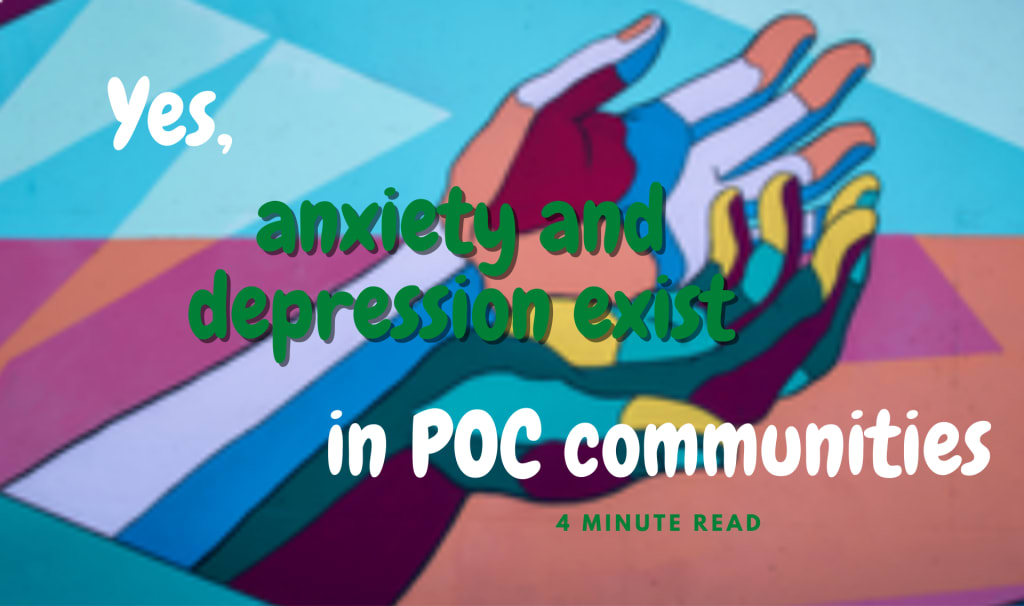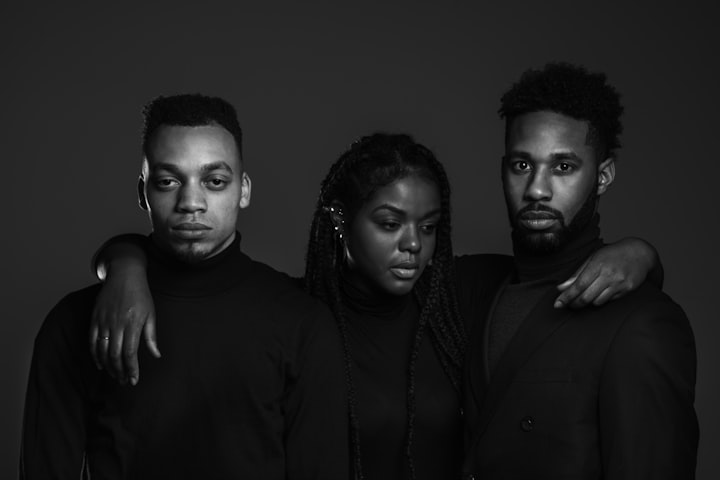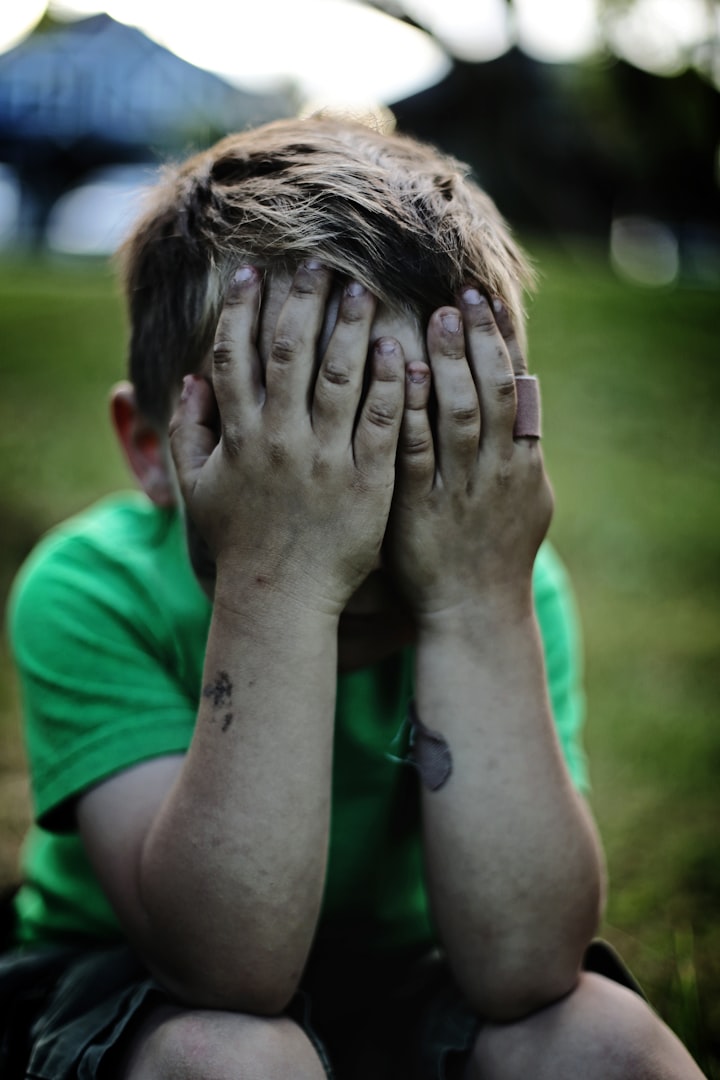Yes, anxiety and depression exist in POC communities
Even if you choose to ignore them

A common lesson I was taught by my parents during my childhood is that you won't know if you don't ask. Can I go over a friend's house to spend a night? I won't know unless I ask (but let's be real, the answer 98% of the time was no). As I aged into adulthood, that simple lesson was slowly forgotten until I realized that I still needed to ask questions to get a better understanding of aspects of life that affected me, including my mental health.
Though I haven't been officially diagnosed — the stigma of mental health making it difficult to push myself through a psychologist's door — I know that there is something not quite stable with my mental health. It's the little things that begin to add up: the obsessive thoughts on everything negative about you, the pit in your stomach at abnormal periods, the struggle to get out of bed and start the day, the isolating yourself from your loved ones because you feel like you aren't 'worth it.' All of those miniature occurrences in my everyday life has to lead me to believe that I am walking the line of having a form of depression, along with maybe some generalized anxiety, as well.
Besides the stigma of mental health — which really shouldn't exist, given that one in four people in the world will be affected by mental or neurological disorders at some point in their lives and in 2019, around 450 million people suffered from such conditions, placing mental disorders among the leading causes of ill-health and disability worldwide, according to the World Health Organization — it's hard to accept that my mental health isn't stable. Shaking it off as 'not feeling well' or 'having one of those days has resulted in me pushing back the care and support that I not only needed but rightfully deserved.
This is due to a number of things. First, anxiety, depression, and other common and uncommon mental health illnesses are NOT talked about in POC communities. Though I can only speak from the Black community, it's been proven time and time again that persons of color do not talk about or tend to their mental health as they should. Ironically, Black communities have more systematic reasons for unstable mental health: the history of slavery, microaggressions, racial exclusion from proper healthcare, education, and wealth opportunities, overall attack on their racial brothers and sisters by police and negative stereotypes. Collectively, these everyday instances give the Black community, including myself, "serious psychological distress", according to Mental Health America. Mind you, this is on top of the everyday things normal humans deal with, such as the loss of loved ones, divorce, and generalized sadness because the world we live in is truly fucked up.
Black communities are also less likely to talk about these feelings of sadness and despair, either to other family members or to trained professionals. It makes sense. My entire life, my parents preached the idea of being tough and not showing weakness to anyone ever. That idea has been passed down from generation to generation, all attempting to prove that they are indeed worth our white counterpart's time, yet we won't get down if they decide otherwise. Even from a religious or spiritual standpoint, it's easy to use your 'faith in God and His way and His truth' to avoid speaking out about how you feel. From a young age, many Black people are told to rely on Him to fight your battles, and though I am a lifelong Baptist, I feel there's a line between blindly trusting the Lord and helping yourself, in His grace. Amen.
I never heard the words "anxiety" or "depression" until I went to high school, albeit a predominantly white high school. Of course, the mental health 'overviews' were far from comprehensive enough to fully get an understanding, but I began to realize that what I felt in everyday life wasn't normal. My mother, during my parents' divorce, never said she was depressed, though she clearly was — she was 'going through trying times.' I, nor my parents, never said I was a having a panic attack when I began to hyperventilate, cry uncontrollably, and shake as if I were having a seizure — I was 'upset' or 'having an episode' or, when their yelling and reprimands were the cause of the said attack, 'throwing a tantrum.' Instead of therapy or medications, they turned to prayer and sleep, and I never grew up to know I was struggling.
I'd like to state that my parents aren't bad people or bad parents. Yet, they never would've thought to see if I needed psychological help for my mental health because they didn't believe or didn't know. "Culturally, mental problems were considered a sign of weakness," Dion Metzger, MD, a board-certified psychiatrist, professor, and health media expert told TheThirty. This is especially true in Black and Latino communities.
Knowing these cultural differences, there needs to be an initiative to provide mental health resources to the Black community. From affordable therapy to 'erase the stigma' initiatives to mental health education readily available in black neighborhoods and schools. The Black community needs ENCOURAGEMENT to seek the mental health resources they need. Black children need to be educated on the signs of common mental illnesses and feel confident and safe enough to reach out to their parents. Likewise, their parents need to ensure that the idea that mental illnesses = weakness never exists in their household.
How can the Black community break the mental health stigma? By creating more specialized therapy websites and companies like Therapy For Black Girls, Black Mental Health Alliance or the National Alliance on Mental Illness. These resources offer mental health guidance that targets Black life experience. Through more initiatives like these, Black people are able to feel heard, especially within a system that seeks to oppress them for their skin color. This is one of many ways to close the gap between Black Americans and their white counterparts.
I hope that I'll be able to afford and seek out mental health resources soon. Until then, I'll use some personal self-care activities to take control of my anxiety and depression. I hope you're able to find something that'll help you too. Remember, whether you're Black, white, Latinx, Asian, Indian, Indigenous, or any combination, you aren't alone in your mental health fight.
About the Creator
SaMya Overall
Fiction, poetry, and creative non-fiction writer with a love for cliche tropes reimagined in a new way.
For more works: https://www.minialternaterealities.com






Comments
There are no comments for this story
Be the first to respond and start the conversation.